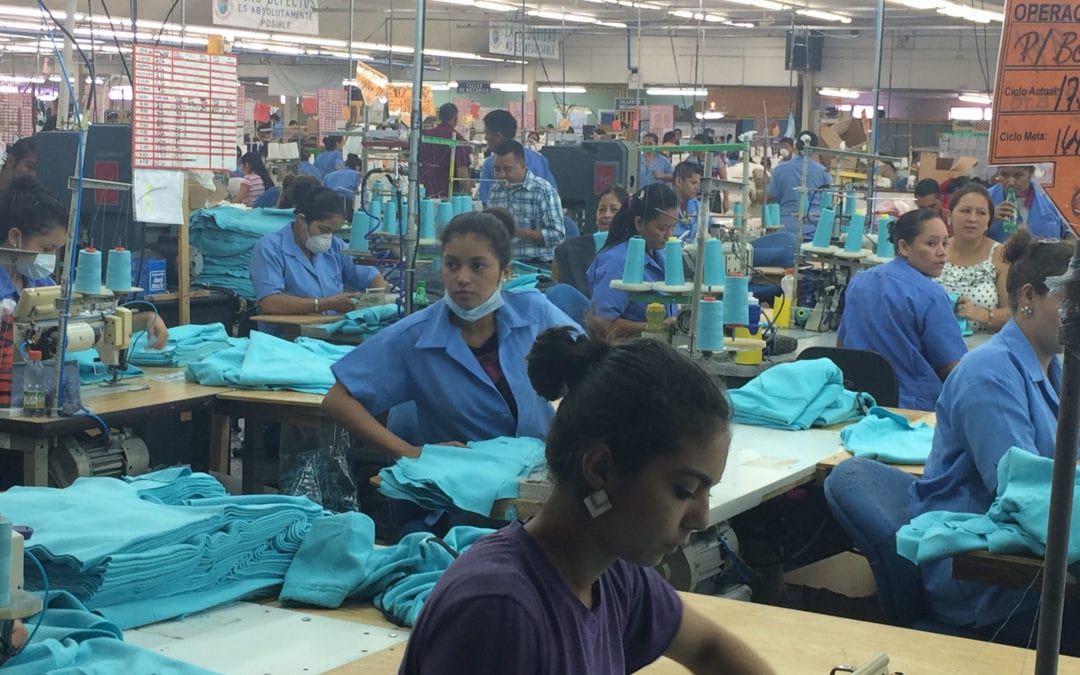
Report: Collective Bargaining Transforms Workers’ Lives
A powerful new report shows that collective bargaining changes work and workers’ lives for the better. According to the report, workers in Honduras with collective bargaining agreements are less likely to feel compelled to migrate or to face verbal abuse, and they earn more than workers without collective bargaining agreements. The Solidarity Center-supported report, “Bargaining for Decent Work and Beyond: Transforming Work and Lives Through Collective Bargaining Agreements in the Honduran Maquila Sector,” was published by the Center for Global Workers’ Rights.
“Collective bargaining ultimately is about transforming lives,” said Solidarity Center Executive Director Shawna Bader-Blau, who moderated a panel discussion launching the report. “Not only do better wages and working conditions result from collective bargaining, but workers report dignity and respect on the job for the first time through collective bargaining and unions.”
Report author Mark Anner, director of Pennsylvania State University Center for Global Workers’ Rights, highlighted some key findings of the report. He said:
- Workers covered by a collective bargaining agreement are 25.3 percent less likely to feel compelled to migrate than workers without a collective bargaining agreement.
- Honduran garment workers with a collective bargaining agreement are 67 percent more likely to always have the choice to work overtime or not.
- Workers not covered by a collective bargaining agreement are 20.3 percent more likely to face verbal abuse.
- Female workers without a collective bargaining agreement are 10.7 percent more likely to face sexual harassment on the job.
- Workers with collective bargaining agreements earn 7 percent more than workers without collective bargaining agreements.
“Workers experience tangible and intangible benefits from having collective bargaining agreements,” Anner said. He quoted some workers as saying, “We are listened to now” and “Management shows us respect as workers.”
The report documents the expansion of collective bargaining agreements in the maquila sector, following a 2009 binding agreement between workers and a garment manufacturer. As of last year, 50,625 workers, mostly in the garment industry, were covered by 21 collective bargaining agreements in the Honduran export assembly sector.
Bader-Blau emphasized that the report shows the importance of worker-driven research, as suggested by the Solidary Center. “Unions lead and show outcomes to the rest of the world through the power of their own stories,” she said.
Union leaders like Eva Argueta, a leader in organizing tens of thousands of garment workers in Honduras, led the process of connecting with workers to help them share their work experiences.
Speaking on the panel, Argueta, representative for the General Workers Central (CGT, Honduras) and Maquila Organizing Project coordinator, described the process. “The person responding is much more likely to trust someone that they know who is doing the survey,” she said. “It can be a delicate thing because of the fear the boss might find out.”
Worker-leaders interviewed a total of 387 workers with and without collective bargaining agreements.
Other panelists included Joel López, general secretary of the Independent Federation of Workers of Honduras (FITH), Tara Mathur, field director for the Americas at the Worker Rights Consortium (WRC), and María Elena Sabillón, Solidarity Center senior coordinator in Honduras.
As Sabillón shared in her remarks, “Collective bargaining agreements allow for real progress in both labor and human rights. CBAs today go beyond economic clauses. Unions are winning clauses on equality, combating violence and harassment in the world of work and respecting the dignity of each person. These CBAs are validating a broader rights-based approach.”
